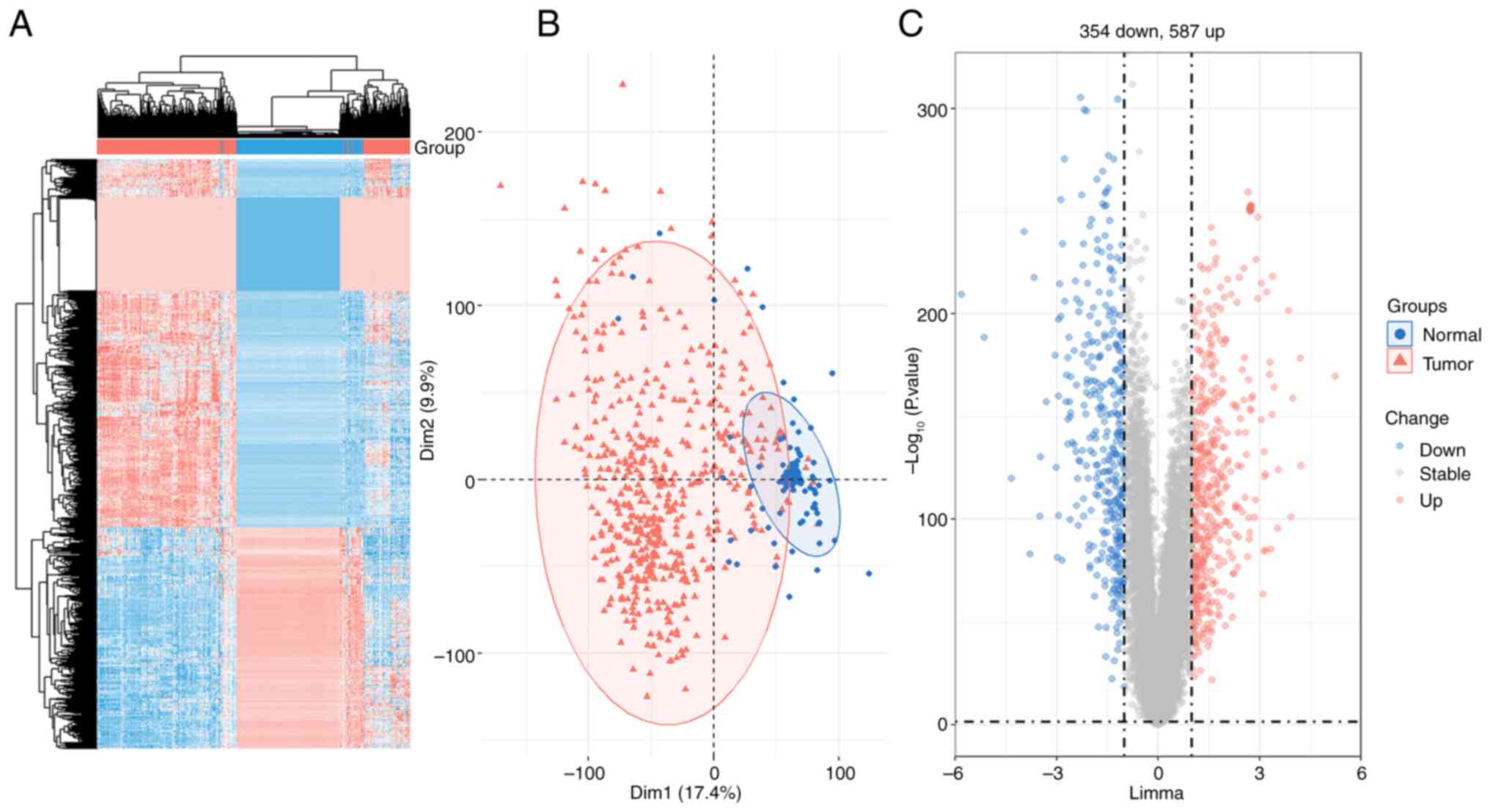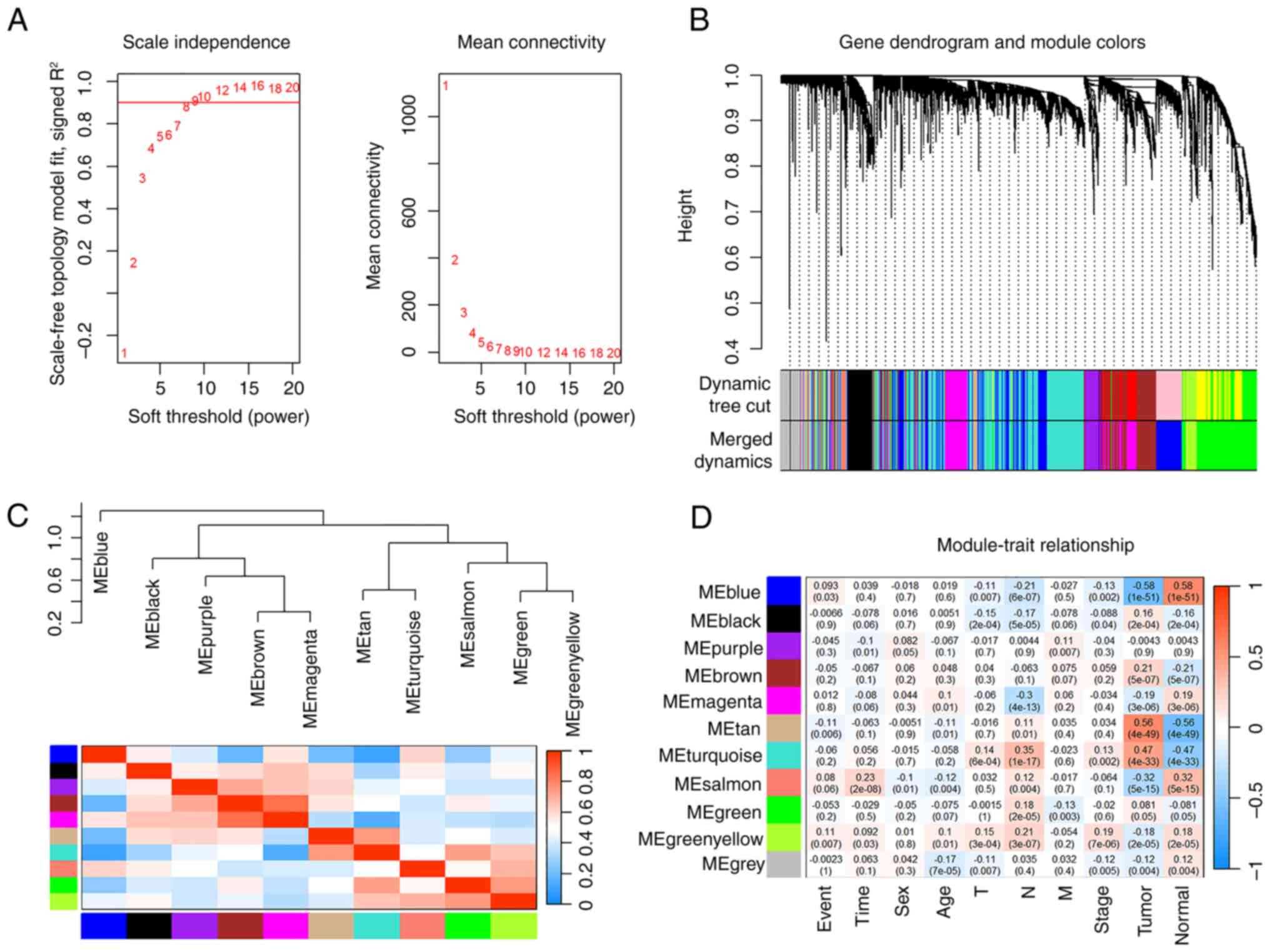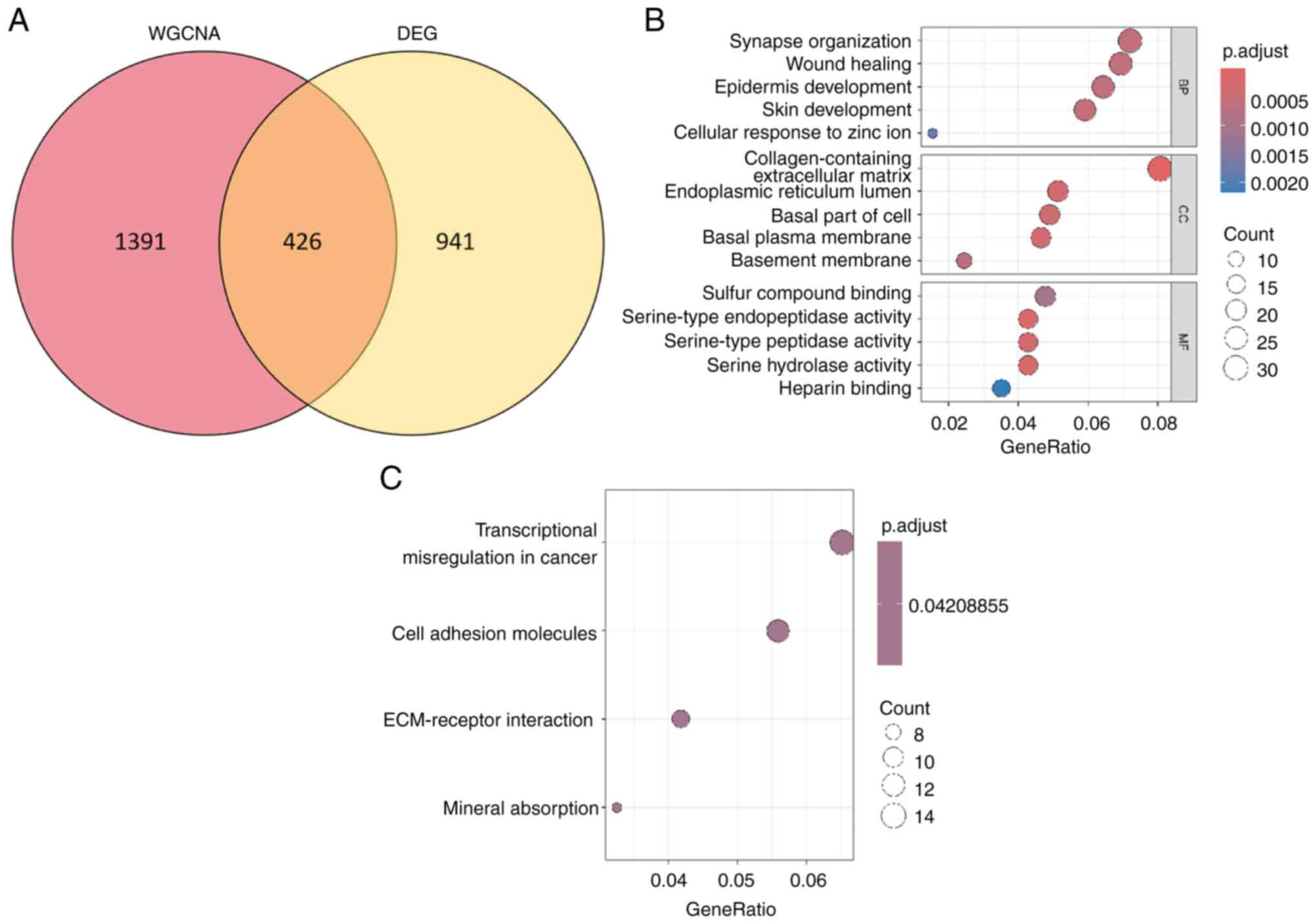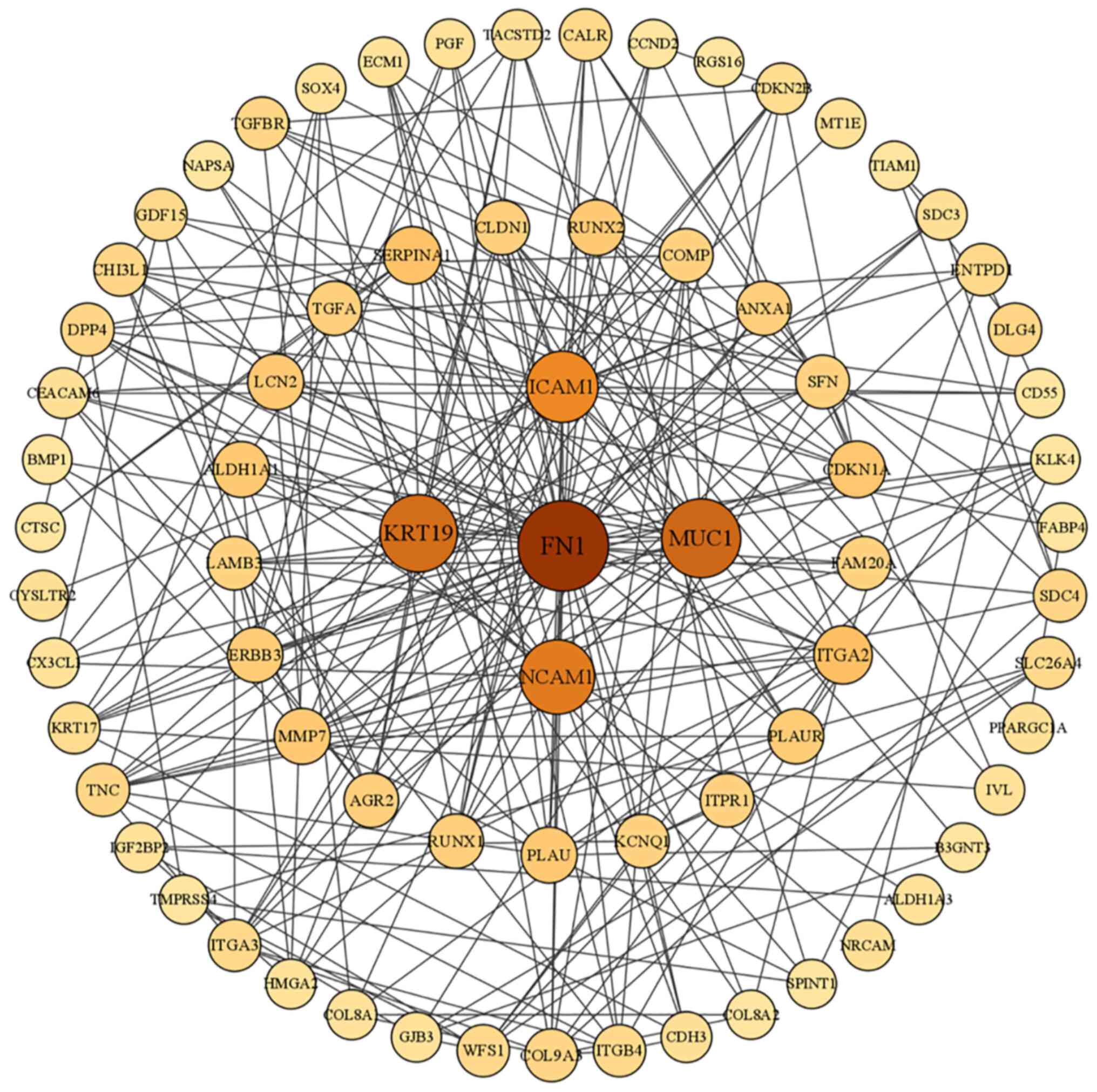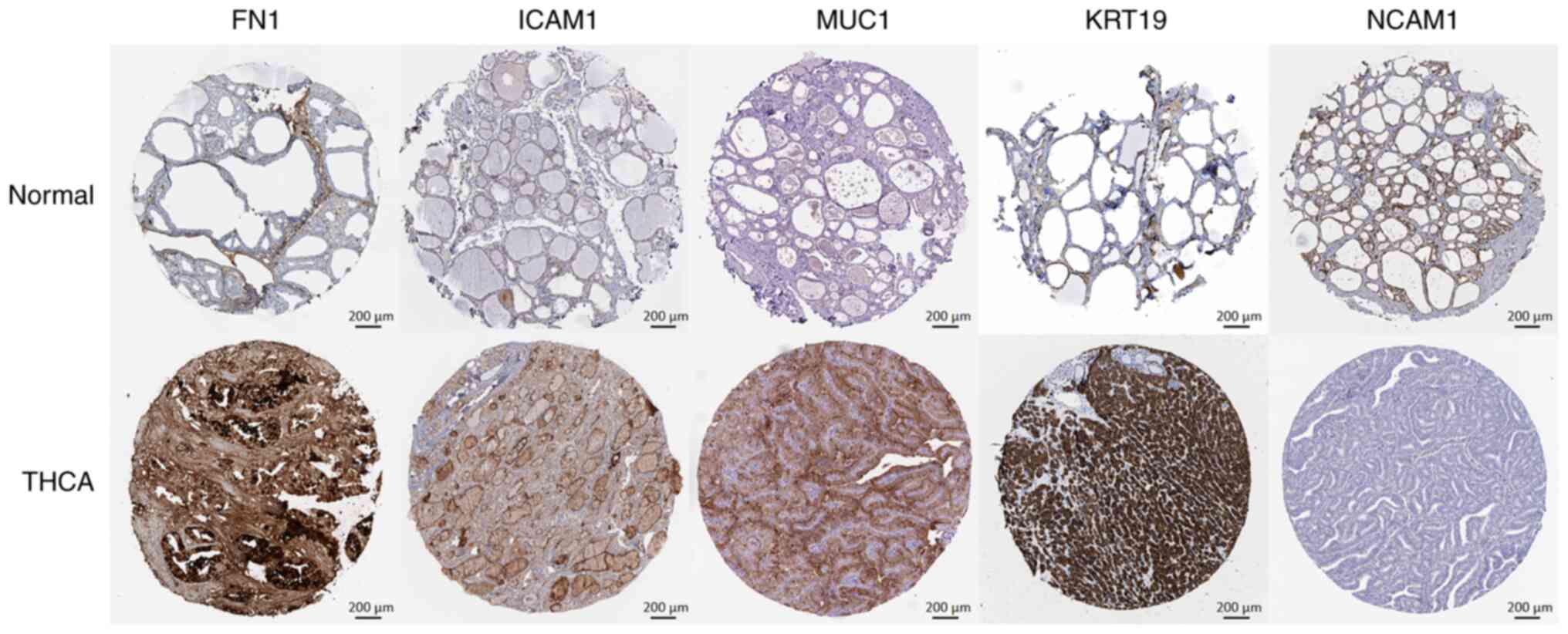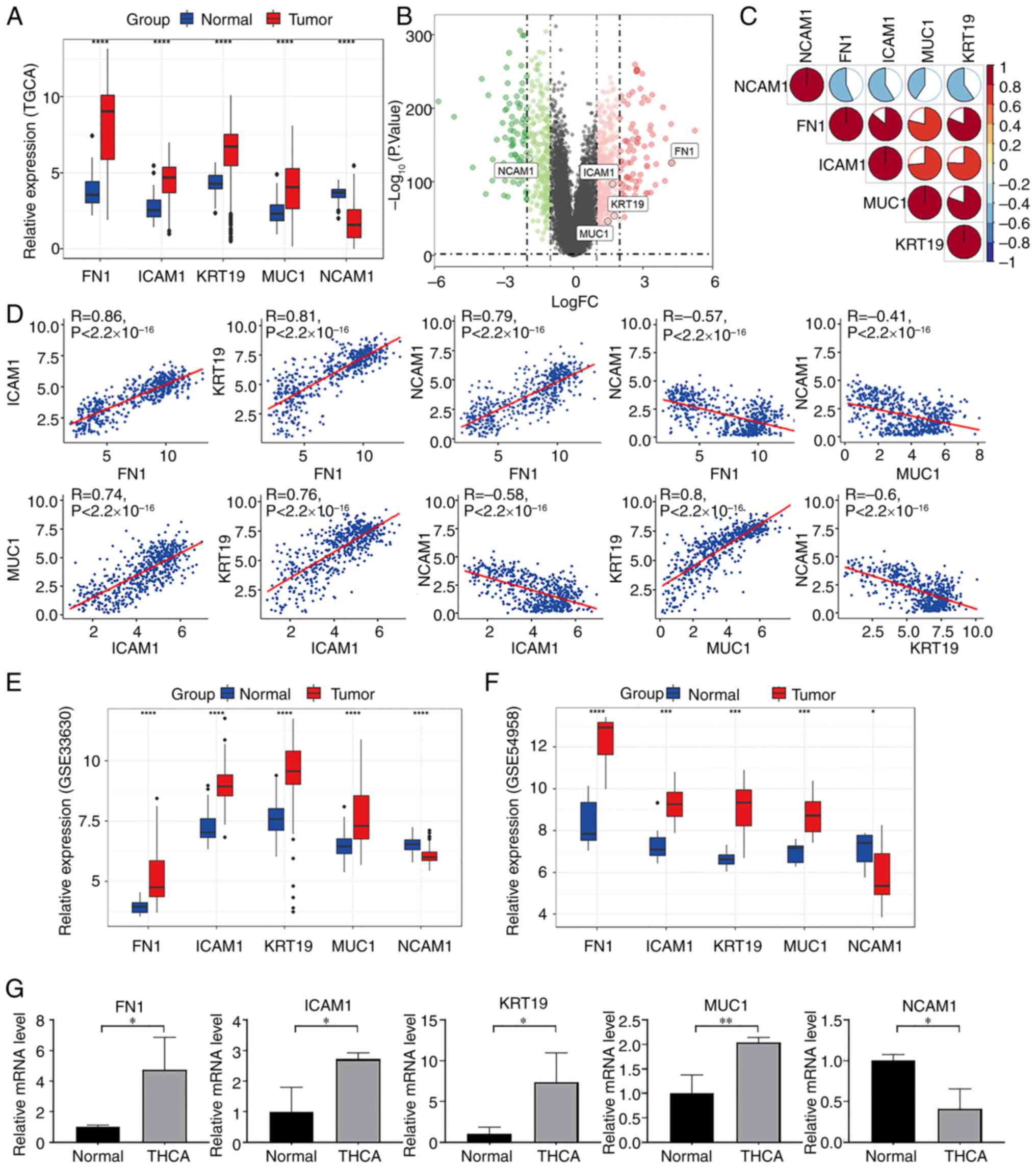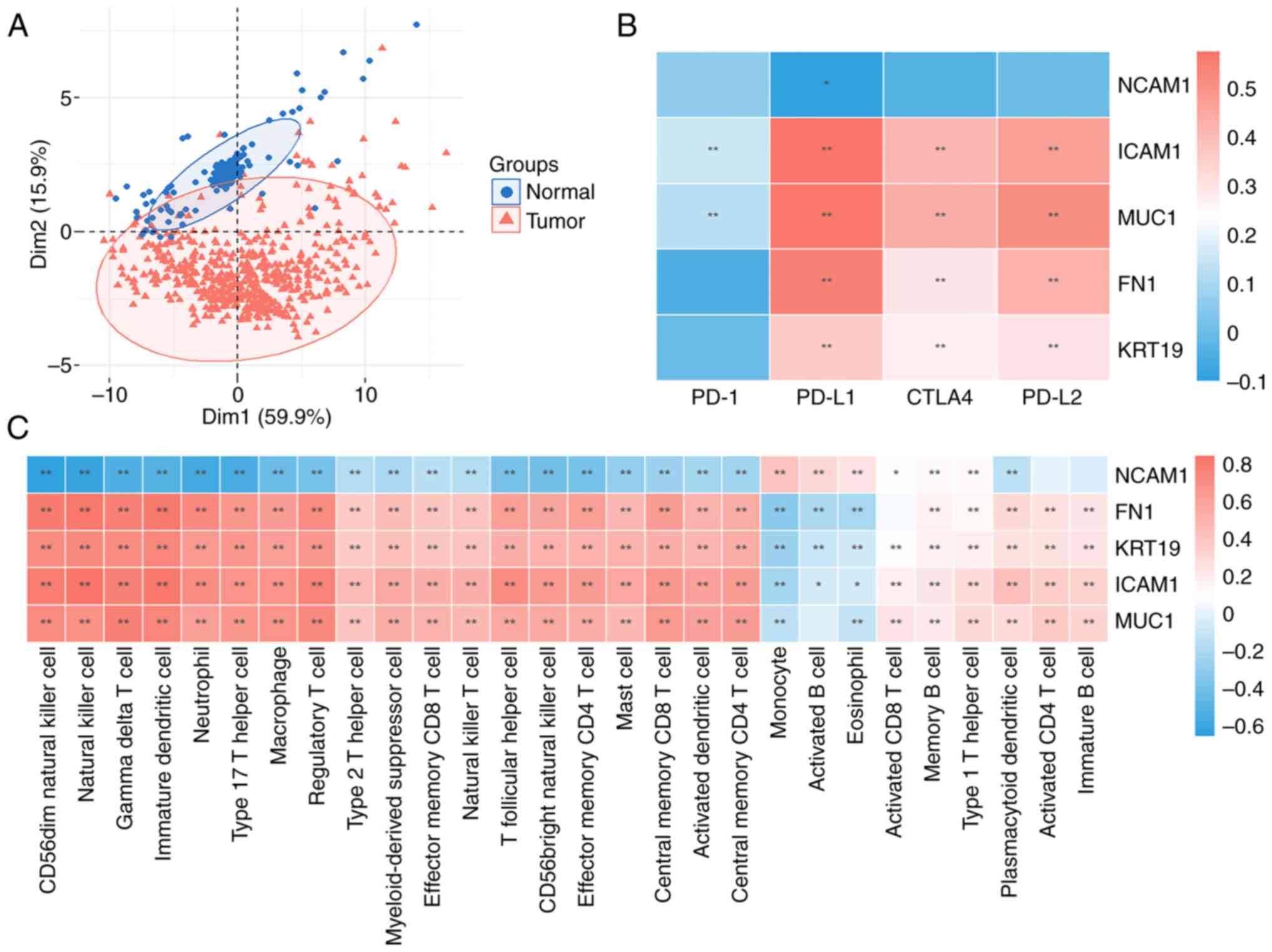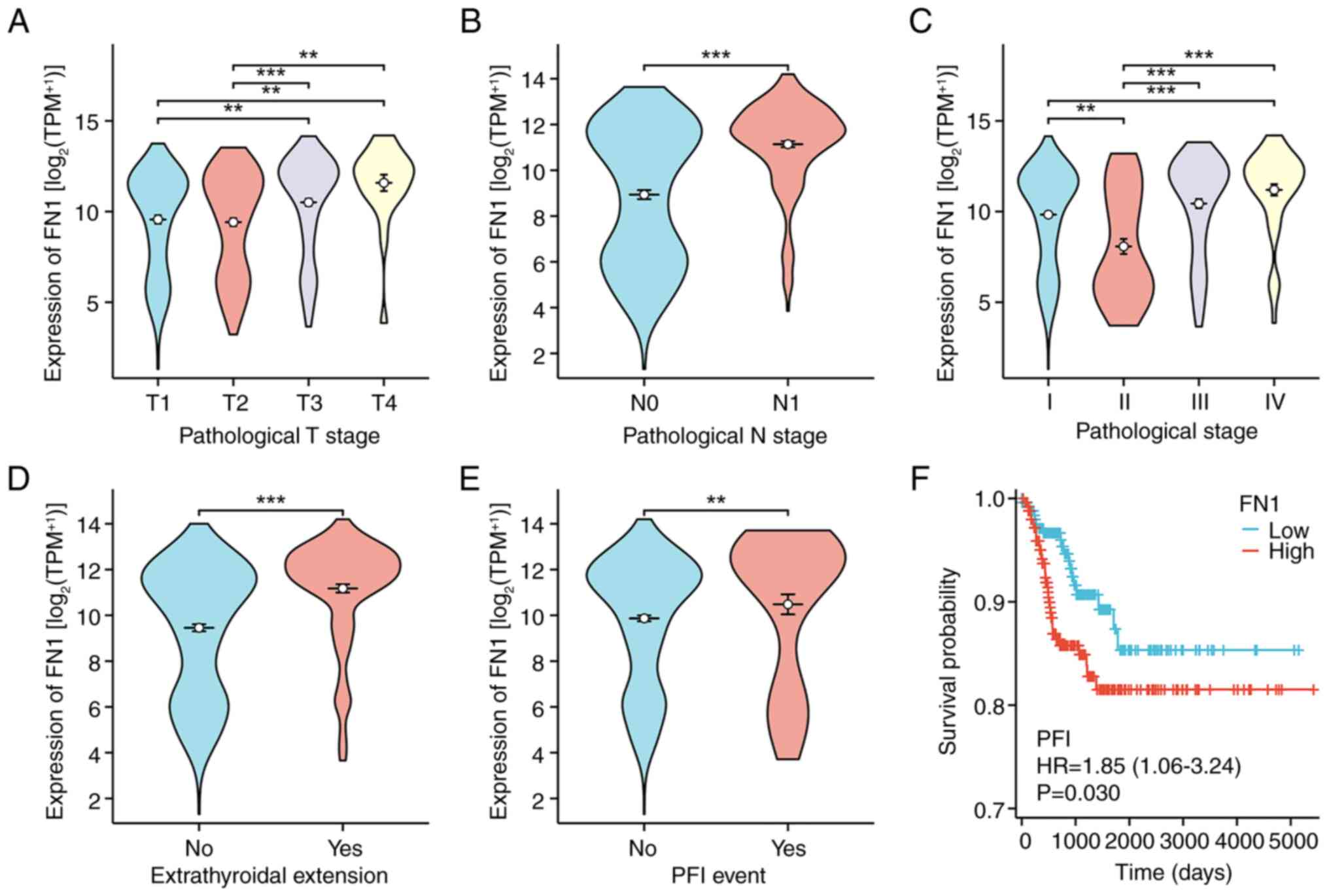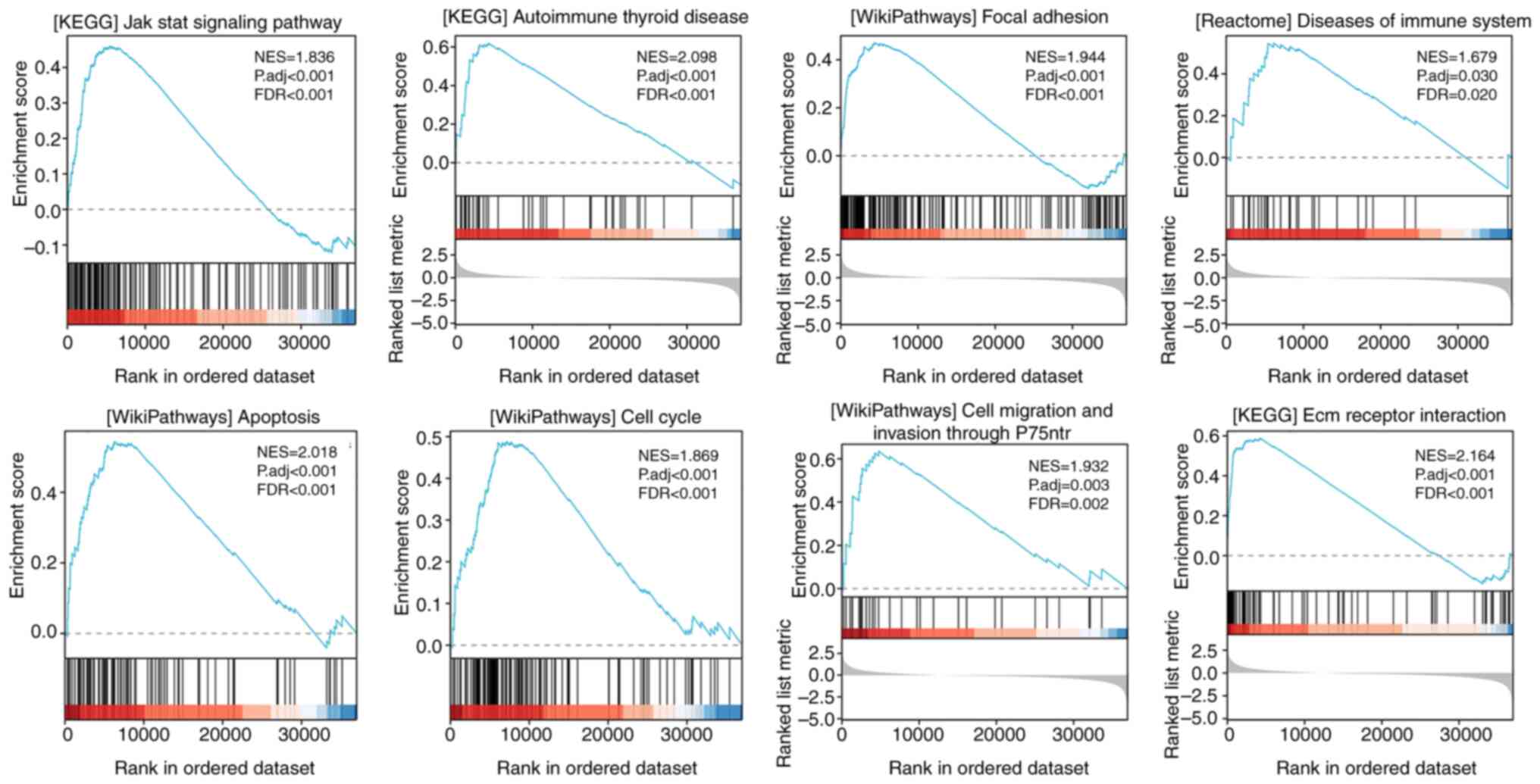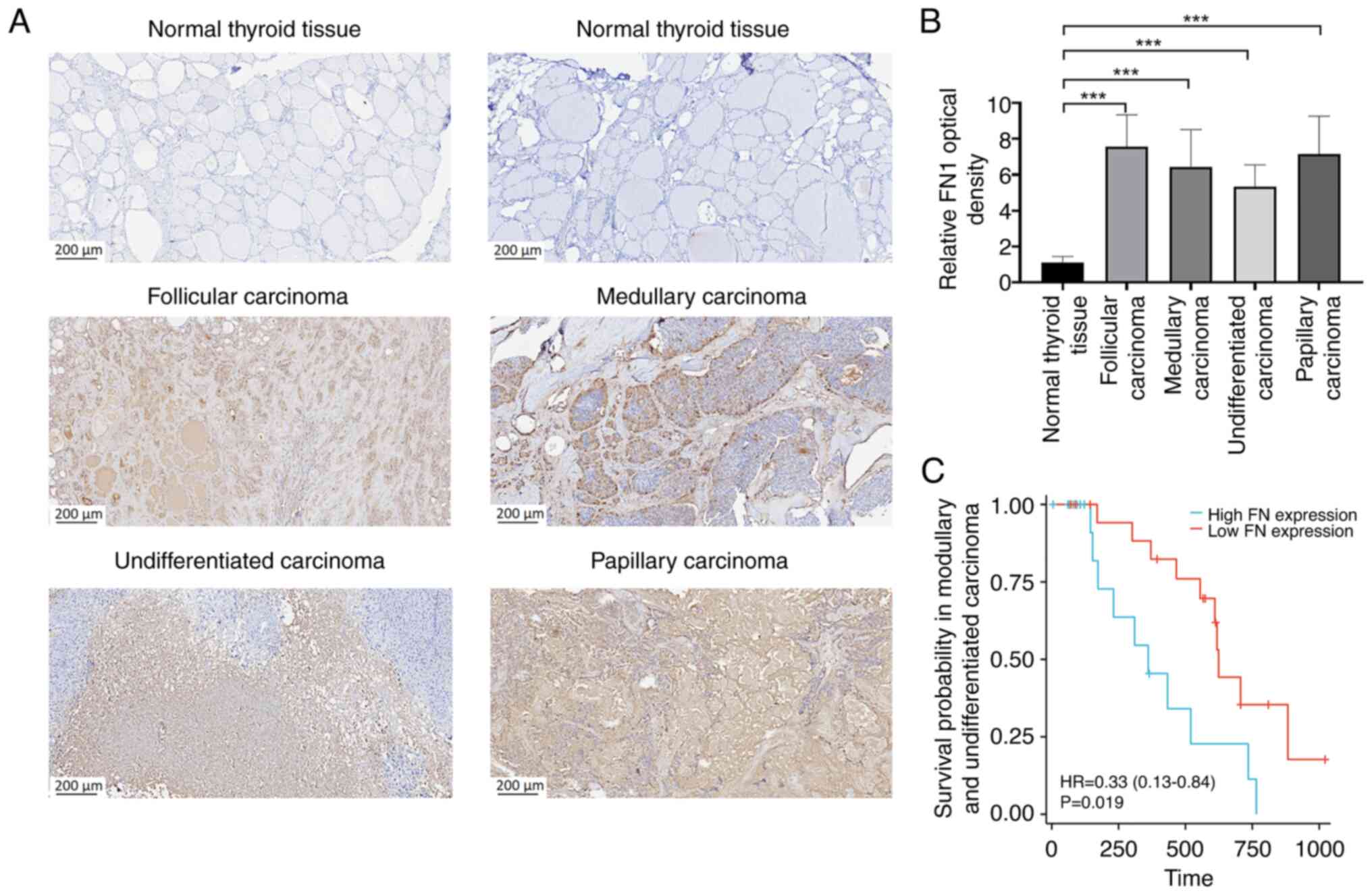|
1
|
Zhou YL, Zheng C, Chen YT and Chen XM:
Underexpression of INPPL1 is associated with aggressive
clinicopathologic characteristics in papillary thyroid carcinoma.
Onco Targets Ther. 11:7725–7731. 2018. View Article : Google Scholar : PubMed/NCBI
|
|
2
|
Cabanillas ME, McFadden DG and Durante C:
Thyroid cancer. Lancet. 388:2783–2795. 2016. View Article : Google Scholar : PubMed/NCBI
|
|
3
|
Ge J, Wang J, Wang H, Jiang X, Liao Q,
Gong Q, Mo Y, Li X, Li G, Xiong W, et al: The BRAF V600E mutation
is a predictor of the effect of radioiodine therapy in papillary
thyroid cancer. J Cancer. 11:932–939. 2020. View Article : Google Scholar : PubMed/NCBI
|
|
4
|
Ma T, Wang R, Zhou X, Liu L, Pan A, Wang H
and Huang L: Case reports of collision and composite carcinomas of
the thyroid: An insight into their origin and clinical
significance. BMC Endocr Disord. 23:1732023. View Article : Google Scholar : PubMed/NCBI
|
|
5
|
Wan Y, Zhang X, Leng H, Yin W, Zeng W and
Zhang C: Identifying hub genes of papillary thyroid carcinoma in
the TCGA and GEO database using bioinformatics analysis. PeerJ.
8:e91202020. View Article : Google Scholar : PubMed/NCBI
|
|
6
|
Ejiofor EU, Ishebe JE, Benjamin I, Okon
GA, Gber TE and Louis H: Exploring the potential of single-metals
(Cu, Ni, Zn) Decorated Al12N12 nanostructures
as sensors for flutamide anticancer drug. Heliyon. 9:e206822023.
View Article : Google Scholar : PubMed/NCBI
|
|
7
|
Feng G, Chen C and Luo Y: PRMT1
accelerates cell proliferation, migration, and tumor growth by
upregulating ZEB1/H4r3me2as in thyroid carcinoma. Oncol Rep.
50:2102023. View Article : Google Scholar : PubMed/NCBI
|
|
8
|
Xu W, Wang L, An Y and Ye J: Expression of
WD repeat domain 5 (WDR5) is associated with progression and
reduced prognosis in papillary thyroid carcinoma. Med Sci Monit.
25:3762–3770. 2019. View Article : Google Scholar : PubMed/NCBI
|
|
9
|
Liu X, Huang Z, He X, Zheng X, Jia Q, Tan
J, Fan Y, Lou C and Meng Z: Blood prognostic predictors of
treatment response for patients with papillary thyroid cancer.
Biosci Rep. 40:BSR202025442020. View Article : Google Scholar : PubMed/NCBI
|
|
10
|
Liao Z, Cheng Y, Zhang H, Jin X, Sun H,
Wang Y and Yan J: A novel prognostic signature and immune
microenvironment characteristics associated with disulfidptosis in
papillary thyroid carcinoma based on Single-Cell RNA sequencing.
Front Cell Dev Biol. 11:13083522023. View Article : Google Scholar : PubMed/NCBI
|
|
11
|
Soll D, Bischoff P, Frisch A, Jensen M,
Karadeniz Z, Mogl MT, Horst D, Penzkofer T, Spranger J, Keilholz U
and Mai K: First effectiveness data of lenvatinib and pembrolizumab
as First-Line therapy in advanced anaplastic thyroid cancer: A
retrospective cohort study. BMC Endocr Disord. 24:252024.
View Article : Google Scholar : PubMed/NCBI
|
|
12
|
Tan JSH, Tay TKY, Ong EHW, Fehlings M, Tan
DS, Sukma NB, Chen EX, Sng JH, Yip CSP, Lim KH, et al:
Combinatorial hypofractionated radiotherapy and pembrolizumab in
anaplastic thyroid cancer. Eur Thyroid J. 13:e2301442024.
View Article : Google Scholar : PubMed/NCBI
|
|
13
|
Oh DY, Algazi A, Capdevila J, Longo F,
Miller W Jr, Chun Bing JT, Bonilla CE, Chung HC, Guren TK, Lin CC,
et al: Efficacy and safety of pembrolizumab monotherapy in patients
with advanced thyroid cancer in the phase 2 KEYNOTE-158 study.
Cancer. 129:1195–1204. 2023. View Article : Google Scholar : PubMed/NCBI
|
|
14
|
Yi PQ, Nie FF, Fan YB, Yu WW, Hu CS, Guo
XM and Fu J: Intraoperative radiotherapy for the treatment of
thyroid cancer: A pilot study. Oncotarget. 8:29355–29360. 2017.
View Article : Google Scholar : PubMed/NCBI
|
|
15
|
Lan X, Bao H, Ge X, Cao J, Fan X, Zhang Q,
Liu K, Zhang X, Tan Z, Zheng C, et al: Genomic landscape of
metastatic papillary thyroid carcinoma and novel biomarkers for
predicting distant metastasis. Cancer Sci. 111:2163–2173. 2020.
View Article : Google Scholar : PubMed/NCBI
|
|
16
|
Suzuki S, Bogdanova TI, Saenko VA,
Hashimoto Y, Ito M, Iwadate M, Rogounovitch TI, Tronko MD and
Yamashita S: Histopathological analysis of papillary thyroid
carcinoma detected during ultrasound screening examinations in
fukushima. Cancer Sci. 110:817–827. 2019. View Article : Google Scholar : PubMed/NCBI
|
|
17
|
Ohno K, Shibata T and Ito KI: Epidermal
growth factor receptor activation confers resistance to lenvatinib
in thyroid cancer cells. Cancer Sci. 113:3193–3210. 2022.
View Article : Google Scholar : PubMed/NCBI
|
|
18
|
Yu Y and Tian X: Analysis of genes
associated with prognosis of lung adenocarcinoma based on GEO and
TCGA databases. Medicine (Baltimore). 99:e201832020. View Article : Google Scholar : PubMed/NCBI
|
|
19
|
Silva JCF, Carvalho TFM, Basso MF, Deguchi
M, Pereira WA, Sobrinho RR, Vidigal PMP, Brustolini OJB, Silva FF,
Dal-Bianco M, et al: Geminivirus data warehouse: A database
enriched with machine learning approaches. BMC Bioinformatics.
18:2402017. View Article : Google Scholar : PubMed/NCBI
|
|
20
|
Pankov R and Yamada KM: Fibronectin at a
glance. J Cell Sci. 115:3861–3863. 2002. View Article : Google Scholar : PubMed/NCBI
|
|
21
|
Malik G, Knowles LM, Dhir R, Xu S, Yang S,
Ruoslahti E and Pilch J: Plasma fibronectin promotes lung
metastasis by contributions to fibrin clots and tumor cell
invasion. Cancer Res. 70:4327–4334. 2010. View Article : Google Scholar : PubMed/NCBI
|
|
22
|
Xiao J, Yang W, Xu B, Zhu H, Zou J, Su C,
Rong J, Wang T and Chen Z: Expression of fibronectin in esophageal
squamous cell carcinoma and its role in migration. BMC Cancer.
18:9762018. View Article : Google Scholar : PubMed/NCBI
|
|
23
|
Cai X, Liu C, Zhang TN, Zhu YW, Dong X and
Xue P: Down-regulation of FN1 inhibits colorectal carcinogenesis by
suppressing proliferation, migration, and invasion. J Cell Biochem.
119:4717–4728. 2018. View Article : Google Scholar : PubMed/NCBI
|
|
24
|
Nakagawa Y, Nakayama H, Nagata M, Yoshida
R, Kawahara K, Hirosue A, Tanaka T, Yuno A, Matsuoka Y, Kojima T,
et al: Overexpression of fibronectin confers cell adhesion-mediated
drug resistance (CAM-DR) against 5-FU in oral squamous cell
carcinoma cells. Int J Oncol. 44:1376–1384. 2014. View Article : Google Scholar : PubMed/NCBI
|
|
25
|
Wang J, Deng L, Huang J, Cai R, Zhu X, Liu
F, Wang Q, Zhang J and Zheng Y: High expression of fibronectin 1
suppresses apoptosis through the NF-κB pathway and is associated
with migration in nasopharyngeal carcinoma. Am J Transl Res.
9:4502–4511. 2017.PubMed/NCBI
|
|
26
|
Waalkes S, Atschekzei F, Kramer MW,
Hennenlotter J, Vetter G, Becker JU, Stenzl A, Merseburger AS,
Schrader AJ, Kuczyk MA and Serth J: Fibronectin 1 mRNA expression
correlates with advanced disease in renal cancer. BMC Cancer.
10:5032010. View Article : Google Scholar : PubMed/NCBI
|
|
27
|
Glasner A, Levi A, Enk J, Isaacson B,
Viukov S, Orlanski S, Scope A, Neuman T, Enk CD, Hanna JH, et al:
NKp46 Receptor-Mediated Interferon-γ production by natural killer
cells increases fibronectin 1 to alter tumor architecture and
control metastasis. Immunity. 48:107–119.e4. 2018. View Article : Google Scholar : PubMed/NCBI
|
|
28
|
Chen W, Wang J, Shi J, Yang X, Yang P,
Wang N, Yang S, Xie T, Yang H, Zhang M, et al: Longevity effect of
liuwei dihuang in both caenorhabditis elegans and aged mice. Aging
Dis. 10:578–591. 2019. View Article : Google Scholar : PubMed/NCBI
|
|
29
|
Cao J, Huang M, Guo L, Zhu L, Hou J, Zhang
L, Pero A, Ng S, El Gaamouch F, Elder G, et al: Microrna-195
rescues Apoe4-Induced cognitive deficits and lysosomal defects in
Alzheimer's disease pathogenesis. Mol Psychiatry. 26:4687–4701.
2021. View Article : Google Scholar : PubMed/NCBI
|
|
30
|
Wu C, Qi X, Qiu Z, Deng G and Zhong L: Low
expression of KIF20A suppresses cell proliferation, promotes
chemosensitivity and is associated with better prognosis in HCC.
Aging (Albany NY). 13:22148–22163. 2021. View Article : Google Scholar : PubMed/NCBI
|
|
31
|
Shi Y, Liu W, Yang Y, Ci Y and Shi L:
Exploration of the shared molecular mechanisms between COVID-19 and
neurodegenerative diseases through bioinformatic analysis. Int J
Mol Sci. 24:48392023. View Article : Google Scholar : PubMed/NCBI
|
|
32
|
Shi J, Shui D, Su S, Xiong Z and Zai W:
Gene enrichment and co-expression analysis shed light on
transcriptional responses to Ralstonia solanacearum in tomato. BMC
Genomics. 24:1592023. View Article : Google Scholar : PubMed/NCBI
|
|
33
|
Li M, Wang K, Zhang Y, Fan M, Li A, Zhou
J, Yang T, Shi P, Li D, Zhang G, et al: Ferroptosis-Related genes
in bronchoalveolar lavage fluid serves as prognostic biomarkers for
idiopathic pulmonary fibrosis. Front Med (Lausanne). 8:6939592021.
View Article : Google Scholar : PubMed/NCBI
|
|
34
|
Yi X, Wan Y, Cao W, Peng K, Li X and Liao
W: Identification of four novel prognostic biomarkers and
construction of two nomograms in adrenocortical carcinoma: A
Multi-Omics data study via bioinformatics and machine learning
methods. Front Mol Biosci. 9:8780732022. View Article : Google Scholar : PubMed/NCBI
|
|
35
|
Yu J, Zhang H, Zhang Y and Zhang X:
Integrated analysis of the altered lncRNA, microRNA, and mRNA
expression in HBV-Positive hepatocellular carcinoma. Life (Basel).
12:7012022.PubMed/NCBI
|
|
36
|
Zhou J, Guo H, Liu L, Feng M, Yang X and
Hao S: Pyroptosis patterns of colon cancer could aid to estimate
prognosis, microenvironment and immunotherapy: Evidence from
Multi-Omics analysis. Aging (Albany NY). 14:7547–7567. 2022.
View Article : Google Scholar : PubMed/NCBI
|
|
37
|
Yin S, Li X, Xiong Z, Xie M, Jin L, Chen
H, Mao C, Zhang F and Lian L: A novel ceRNA-Immunoregulatory axis
based on immune cell infiltration in ulcerative colitis-associated
colorectal carcinoma by integrated weighted gene co-expression
network analysis. BMC Gastroenterol. 22:1882022. View Article : Google Scholar : PubMed/NCBI
|
|
38
|
Adegoke A, Ribeiro JMC, Smith RC and Karim
S: Tick innate immune responses to hematophagy and Ehrlichia
infection at single-cell resolution. Front Immunol. 14:13059762023.
View Article : Google Scholar : PubMed/NCBI
|
|
39
|
Shaw TI, Wagner J, Tian L, Wickman E,
Poudel S, Wang J, Paul R, Koo SC, Lu M, Sheppard H, et al:
Discovery of immunotherapy targets for pediatric solid and brain
tumors by Exon-Level expression. Nat Commun. 15:37322024.
View Article : Google Scholar : PubMed/NCBI
|
|
40
|
Pan Y, Wu L, He S, Wu J, Wang T and Zang
H: Identification of hub genes in thyroid carcinoma to predict
prognosis by integrated bioinformatics analysis. Bioengineered.
12:2928–2940. 2021. View Article : Google Scholar : PubMed/NCBI
|
|
41
|
Liu T, Men Q, Su X, Chen W, Zou L, Li Q,
Song M, Ouyang D, Chen Y, Li Z, et al: Downregulated expression of
TSHR is associated with distant metastasis in thyroid cancer. Oncol
Lett. 14:7506–7512. 2017.PubMed/NCBI
|
|
42
|
Xia E, Bhandari A, Shen Y, Zhou X and Wang
O: LncRNA LINc00673 induces proliferation, metastasis and
Epithelial-Mesenchymal transition in thyroid carcinoma via
Kruppel-Like factor 2. Int J Oncol. 53:1927–1938. 2018.PubMed/NCBI
|
|
43
|
Zhang XX, Luo JH and Wu LQ: Fn1
overexpression is correlated with unfavorable prognosis and immune
infiltrates in breast cancer. Front Genet. 13:9136592022.
View Article : Google Scholar : PubMed/NCBI
|
|
44
|
Geng QS, Huang T, Li LF, Shen ZB, Xue WH
and Zhao J: Over-Expression and prognostic significance of FN1,
correlating with immune infiltrates in thyroid cancer. Front Med
(Lausanne). 8:8122782021. View Article : Google Scholar : PubMed/NCBI
|
|
45
|
Huo X, Ma S, Wang C, Song L, Yao B, Zhu S,
Li P, Wang L, Wu Z and Wang K: Unravelling the role of immune cells
and FN1 in the recurrence and therapeutic process of skull base
chordoma. Clin Transl Med. 13:e14292023. View Article : Google Scholar : PubMed/NCBI
|
|
46
|
Ashok G and Ramaiah S: Fn1 and
cancer-associated fibroblasts markers influence immune
microenvironment in clear cell renal cell carcinoma. J Gene Med.
25:e35562023. View Article : Google Scholar : PubMed/NCBI
|
|
47
|
Zhang L, Wang Y, Song M, Chang A, Zhuo W
and Zhu Y: Fibronectin 1 as a key gene in the genesis and
progression of Cadmium-Related bladder cancer. Biol Trace Elem Res.
201:4349–4359. 2023. View Article : Google Scholar : PubMed/NCBI
|
|
48
|
Li J, Chen C, Chen B and Guo T: High FN1
expression correlates with gastric cancer progression. Pathol Res
Pract. 239:1541792022. View Article : Google Scholar : PubMed/NCBI
|
|
49
|
Chen C, Ye L, Yi J, Liu T and Li Z:
Correction: FN1-mediated activation of aspartate metabolism
promotes the progression of Triple-Negative and luminal a breast
cancer. Breast Cancer Res Treat. 204:425–427. 2024. View Article : Google Scholar : PubMed/NCBI
|
|
50
|
Karaulov AV, Gurina NN, Novikov DV, Fomina
SG and Novikov VV: Role of Muc1 expression in tumor progression.
Vestn Ross Akad Med Nauk. 71:392–396. 2016.(In Russian). PubMed/NCBI
|
|
51
|
Schroeder JA, Adriance MC, Thompson MC,
Camenisch TD and Gendler SJ: MUC1 alters beta-catenin-dependent
tumor formation and promotes cellular invasion. Oncogene.
22:1324–1332. 2003. View Article : Google Scholar : PubMed/NCBI
|
|
52
|
Saha SK, Choi HY, Kim BW, Dayem AA, Yang
GM, Kim KS, Yin YF and Cho SG: KRT19 directly interacts with
β-catenin/RAC1 complex to regulate NUMB-dependent NOTCH signaling
pathway and breast cancer properties. Oncogene. 36:332–349. 2017.
View Article : Google Scholar : PubMed/NCBI
|
|
53
|
Yao H, Yang Z, Liu Z, Miao X, Yang L, Li
D, Zou Q and Yuan Y: Glypican-3 and KRT19 are markers associating
with metastasis and poor prognosis of pancreatic ductal
adenocarcinoma. Cancer Biomark. 17:397–404. 2016. View Article : Google Scholar : PubMed/NCBI
|
|
54
|
Yi J, Tian M, Hu L, Kang N, Ma W, Zhi J,
Zheng X, Ruan X and Gao M: The mechanisms of celastrol in treating
papillary thyroid carcinoma based on network pharmacology and
experiment verification. Ann Transl Med. 9:8662021. View Article : Google Scholar : PubMed/NCBI
|
|
55
|
Sasca D, Szybinski J, Schüler A, Shah V,
Heidelberger J, Haehnel PS, Dolnik A, Kriege O, Fehr EM, Gebhardt
WH, et al: NCAM1 (CD56) promotes leukemogenesis and confers drug
resistance in AML. Blood. 133:2305–2319. 2019. View Article : Google Scholar : PubMed/NCBI
|
|
56
|
Wu H, Fu Z, Li H, Fang F, He B, Ye Y, Wu
H, Xu D, Zheng H and Zhang Q: TRIB3, as a robust prognostic
biomarker for HNSC, is associated with poor immune infiltration and
cancer cell immune evasion. Front Immunol. 14:12908392023.
View Article : Google Scholar : PubMed/NCBI
|















